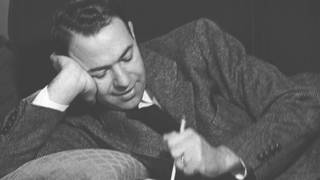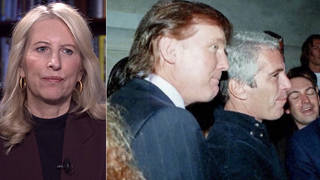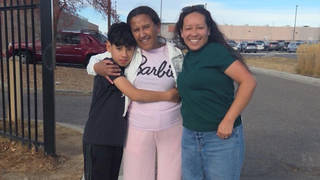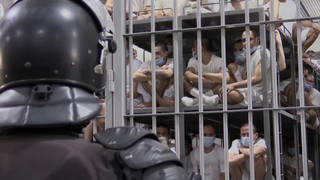
Former President Jimmy Carter, who died on December 29 at the age of 100, has been laid to rest in his hometown of Plains, Georgia, following a state funeral held in Washington, D.C. “He was the last president to actively encourage participation and involvement in governmental processes by the progressive civil community,” remembers the celebrated civil society and consumer advocate Ralph Nader. Nader compares Carter’s progressive credentials to President-elect Donald Trump’s flouting of the law and embrace of dangerous beliefs like climate denialism. Carter “brought the best out of people,” Nader says, while “Trump brings the worst out of people.”
More from this Interview
Transcript
AMY GOODMAN: Right now we go to the national funeral of President Carter. President Biden joined with the four other living presidents Thursday for the state funeral of President Jimmy Carter. He died December 29th at the age of 100. After the service, Carter’s body was flown back to his hometown of Plains, Georgia, where he was buried at his family’s peanut farm next to Rosalynn Carter, his wife of 77 years. She died in 2023. Speakers at the funeral included their grandson, Jason Carter.
JASON CARTER: He gave voice to dissidents, stood up to dictators, brought countries together in peace. His heart broke for the people of Israel. It broke for the people of Palestine. And he spent his life trying to bring peace to that Holy Land. And he talked about it at the dinner table. It was the same in public as it was in private.
AMY GOODMAN: Civil rights activist Andrew Young, who served as U.N. ambassador under President Carter, also spoke at the funeral.
ANDREW YOUNG: James Earl Carter was truly a child of God, not only a good farmer, but a nuclear physicist chosen by Admiral Rickover to assist him in developing a nuclear Navy. But at the same time he was working on a nuclear Navy, he was thinking of peace on Earth and goodwill toward all men, and especially women and children.
AMY GOODMAN: To look more at Jimmy Carter’s legacy at home and abroad, we’re joined by three guests, but we’re beginning with Ralph Nader, the longtime consumer advocate, corporate critic, former presidential candidate, a number of times over. His most recent op-ed for The Atlanta Journal-Constitution is headlined “Jimmy Carter was my last president.”
Welcome to Democracy Now!, Ralph Nader. Why do you say that?
RALPH NADER: He was the last president to actively encourage participation and involvement in governmental processes by the progressive civic community in Washington and around the country. I mean, he insisted on hearing from consumer advocates, environmental advocates, civil rights advocates. And he proved it. He appointed the best possible regulators: for the Federal Trade Commission, Mike Pertschuk; Joan Claybrook for the Auto Safety Agency; Donald Kennedy for the Food and Drug Administration; Doug Costle for the Environmental Protection Agency; and Carol Foreman — all kinds of leaders that would never be inside the government. They would be excluded. Their calls wouldn’t be returned. They couldn’t meet with a president of the United States. And so, he really reflected his motto, “Why not the best?” And he proved it.
You know, we had a president who was rejected by the American people in favor of a grade B actor from Hollywood, Ronald Reagan, who dismantled just about everything that Jimmy Carter did, and put corporations in charge. So, we have the lesson of Jimmy Carter now being conveyed to the American people at long last. And there was Donald Trump in the audience at the National Cathedral. What must be going through his mind? Must be going through his mind is, “This guy Carter was a lot different than I was — I, Donald Trump. But he lost” —
AMY GOODMAN: Well, one thing — one thing for sure that —
RALPH NADER: — “his second term, and I won it.”
AMY GOODMAN: One thing for sure that President-elect Trump has commented on is that the flags will be at half-staff during the inauguration, perhaps the first time ever, and he is very unhappy about that. But if you can elaborate more, Ralph Nader, on why you believe Jimmy Carter lost his second-term bid for president — of course, he lost to Ronald Reagan — and why you believe President Trump won for the second time?
RALPH NADER: Well, he lost in great part because he was sabotaged by his own Democratic Party. He was challenged by Ted Kennedy, of course, which is OK to have a competitive primary, in 1980, but the Democratic Party sabotaged him in Congress. People may not remember that there was a majority-Democrat control of Congress. They should have enhanced what he was doing, and they obstructed him all the way, all the way to defeating the Consumer Protection Agency, which was the prime goal of the consumer movement, which deals with health, safety and economic well-being, after all. And this agency was going to intervene and challenge other federal agencies who were in a cushy relationship with their corporate patrons and playing loose with their mission in the public interest and giving corporations what they wanted. And this agency had the power to take them to court. Well, it was defeated by the Democrats in Congress. And so that weakened his performance.
I think Jimmy Carter’s performance, Amy, illustrates the problem of the electorate, period, that their expectations for what a president should do is very, very low. If you ask average people, “What would you want from a president?” they wouldn’t tell you all that much. They’d say, “Well, he should be honest and keep us strong.” But look what Jimmy Carter did, that was ignored by the expectations of the people, which led to the Reagan landslide of Carter and the loss of many prime senators and representatives in the Congress. He deregulated cartels over the airline, trucking, railroad industry. His personal behavior was exemplary. He was as honest as presidents can come. He was stable. He read. He thought. He acted. He had an efficient use of his time. He paid attention to facts and realities and saw problems and wanted to treat them. He was OK with democracy. He was the first president to deal with renewable energy and warned about the climate issue, which people ignored. This is back in the 1970s. He observed the laws, which succeeding presidents have had a hard time doing. He pressed for arms control treaties. He wanted peace negotiations. He wasn’t just shipping weapons to Netanyahu genocidal action or anywhere in the world. He wanted peace negotiations. And, of course, he kept saying things that brought the best out of people. Trump brings the worst out of people, which is a very, very bad trait for a presidential leader.
AMY GOODMAN: Let me ask you more about the legacy of Carter’s economic policies. In 1984, his former chief domestic policy adviser, Stuart Eizenstat, who eulogized him yesterday at the state funeral, wrote a piece for The Washington Post headlined “In Defense of Jimmy Carter.” Eizenstat wrote, quote, “[H]e began taking the Democrats into the post-New Deal era. He did this by continuing to embrace the party’s traditional social ideals while supporting fiscal moderation and less government intrusion in the economy — a philosophy of government that some now describe as 'neo-liberal.' … He was strongly committed to fiscal moderation and government efficiency. He pressed for tax reductions the nation could afford … It was Jimmy Carter, not Ronald Reagan, who began reducing the regulatory burdens on such industries as airlines, trucking, railroads, communications and banks.” Your last minute, Ralph Nader?
RALPH NADER: Well, I’m just saying that we should observe the lessons of Jimmy Carter here. We’re being led by an unstable, ignorant, corrupt madman. Let’s face it. He thinks climate change is a hoax, notwithstanding the fires, the tornadoes, the hurricanes, the rising sea level, the droughts, the floods. We’re in a very perilous situation.
The only institution that can counter it is the Congress. That’s why we have this Capitol Hill Citizen newspaper, to empower people, to pay attention to Congress, summon to town meetings senators and representatives back in your neighborhood, and show that under the Constitution the Congress can turn the country around. There’s nothing else left, Amy. The lawyers are AWOL in our country against the lawlessness of Trump. The norms that are championed by religious groups, they are not there. The labor unions are weak. The citizenry is not organized.
AMY GOODMAN: Ralph, we’re going to have to leave it there, as we look —
RALPH NADER: But Congress is there, under the Constitution, to make Trump obey the laws.
AMY GOODMAN: We have to leave it there, Ralph Nader, longtime consumer advocate, corporate critic and former presidential candidate.












Media Options